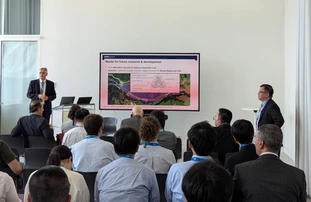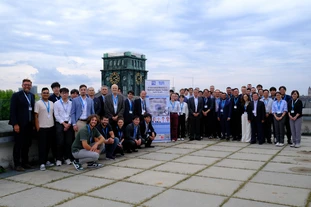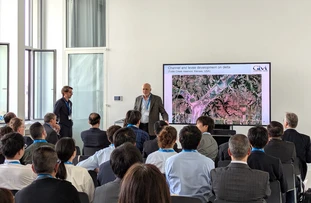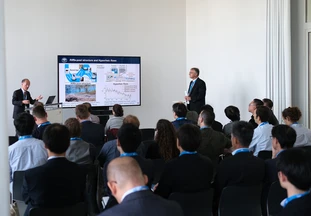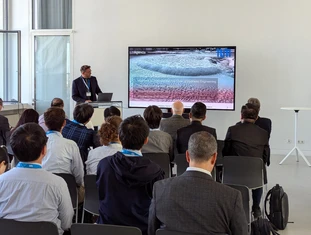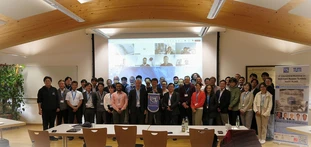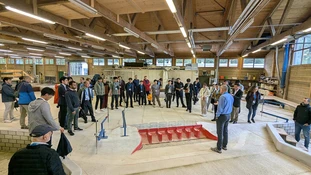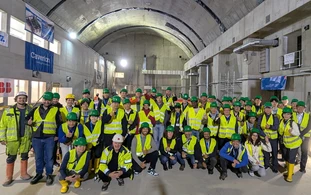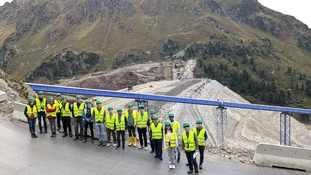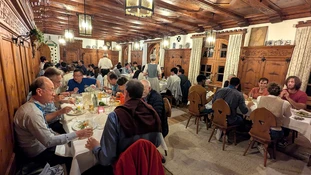Welcome to the 4th International Workshop on Sediment Bypass Tunnels

Organized by:

In Co-operation with:







Summary of the event:
The 4th International Workshop on Sediment Bypass Tunnels (SBTs) was successfully conducted by the Technical University of Munich (TUM) from Sep 8 to Sep 10, 2025.
The three-day program comprised 6 technical sessions, including 5 inspiring keynote lectures and 34 paper presentations, covering a broad spectrum of research and practical advancements in SBTs. The opening session featured Prof. Tetsuya Sumi’s keynote on sediment routing strategies and was followed by engaging presentations on sediment transport mechanisms, bypass tunnel maintenance, desilting efficiency, and abrasion countermeasures. Subsequent sessions highlighted topics such as field monitoring in the USA (Mud Mountain SBT), sediment replenishment in Japan, abrasion forecasting using machine learning, and environmental changes linked to sediment sluicing.
Day 2 was dedicated to an excursion in the Alps, offering participants a unique opportunity to connect theory with practice. The visits to TIWAG’s high-head hydropower plant and hydropeaking retention basin at Silz and the under-construction pumped storage hydropower plant at Küthai showcased real-world challenges in design, operation, and environmental management. The overnight stay in Innsbruck fostered networking and exchange among academia and industry professionals.
On Day 3, the workshop continued at the Oskar von Miller Research Institute in Obernach (TUM), with keynote presentations such as Prof. Tsang-Jung Chang’s integrated assessment of reservoir sediment management in Taiwan and Prof. Zulfequar Ahmad’s physical model study of tunnel spillways in India. Technical sessions highlighted innovative contributions on sediment simulation, optimization using machine learning, and sustainable sedimentation management strategies from across the globe. The day concluded with a guided visit to the Hydraulics Laboratory in Obernach, underlining the importance of physical model studies and academia-industry cooperation in advancing SBT technologies.
The workshop brought together 60 participants from 11 countries, with 58% from academia and 42% from industry, ensuring a rich and balanced exchange of knowledge. This diverse participation reflects the importance of strong academia-industry cooperation for the successful planning, design, construction, and maintenance of SBTs and related hydraulic structures.
We sincerely thank our keynote speakers – Dr. Gregory Morris, Prof. Robert M. Boes, Prof. Tetsuya Sumi, Prof. Tsang-Jung Chang, and Prof. Zulfequar Ahmad – along with all participants, authors, and colleagues from TIWAG (especially Dr. Martin Schletterer) and TUM for their invaluable contributions.
Special thanks also go to our collaborating institutions:
🤝 Norwegian University of Science and Technology (NTNU)
🤝 FH Münster
🤝 ETH Zürich
🤝 Kyoto University
🤝 National Taiwan University
🤝 National Chung Hsing University
🤝 TIWAG-Tiroler Wasserkraft AG
With its mix of inspiring lectures, field excursions, laboratory visits, and international networking, the 4th SBT Workshop successfully advanced global dialogue on sustainable sediment management.
We look forward to seeing you all again at the 5th International Workshop on Sediment Bypass Tunnels in 2027, Japan!
Venue:
0501.05.166 (Vorhoelzer Forum) : see via NavigaTUM
Room 5166, Main Building 0501, 5th Floor, Central Campus : see via Google Map
Please follow the following steps to reach the venue:
Suggested entrance to the building : see via Google Map
After entering through this door → go straight → take a left turn → take the lift up to the 4th floor → exit the lift → take the stairs on the left side to reach Vorhoelzer Forum
Vorhoelzer Forum : This website also provides some details about the venue
Arcistrasse 21, 80333, Munich
Background:
Reservoir sedimentation is a worldwide challenge that seems to accelerate in the last couple of decades with climate change. Amongst numerous sediment management strategies to mitigate this issue, Sediment Bypass Tunnels (SBTs) have proven to be an effective solution, especially for small- to medium-sized reservoirs. SBT design is generally case-specific. Recent laboratory experiments, field studies, as well as numerical investigations have enhanced the existing knowledge on SBT design criteria and the associated challenges, which are to be discussed to a broader audience.
Building upon the success of previous successful workshops on SBTs held in Switzerland (2015), Japan (2017), and Taiwan (2019), we are delighted to invite you to the 4th International Workshop on SBTs. The workshop will take place at the Technical University of Munich, Germany and will provide a platform to exchange knowledge and experience on reservoir sedimentation, sediment routing through SBTs, their designs, related geomorphological and ecological aspects. The main focus shall be on the recent advancements in planning and design, invert abrasion, operation strategies, experimental and field studies, and numerical modeling related to reservoir sedimentation and SBTs and on the technical excursion in the Alps.
Important Dates and Schedule
| Abstract submission opening | 15.01.25 |
| Abstract submission deadline | 07.03.25 |
| Abstract acceptance notification by | 15.03.25 |
| Extended abstract/Full paper submission deadline | 27.05.25 |
| Extended abstract/Full paper review by | 20.06.25 |
| Registration | 15.06.25 – 05.08.25 |
| Keynotes, Technical Sessions | 08.09.25 |
| Excursion | 09.09.25 |
| Excursion, Lab visit, Closing Technical Session | 10.09.25 |
Tentative schedule of activities:
| Date | Time | Activities | Remarks |
| 08.09.2025 | 08:30 – 17:30 | Technical sessions 1 and 2 | Location: TU Munich Main Campus, Arcisstr. 21, 80333 Munich |
| 18:30 – 21:30 | Dinner | ||
| 09.09.2025 | 06:00 – 18:00 | Excursion day: TU Munich to Silz (site) to Küthai (site) to Innsbruck | Important: Overnight Stay at Innsbruck, Austria Please note the following travel arrangements:
|
| 10.09.2025 | 07:30 – 09:00 | Innsbruck to Obernach (laboratory) | |
| 10:00 – 18:00 | Lab visit and technical session 3 | ||
| 18:00 – 20:30 | Obernach (laboratory) to TU Munich | ||
Note: We have reserved the accommodation and food (dinner and breakfast) in Innsbruck (Austria) for the night 09.09.25 on behalf of the participants.
The participants NEED TO PAY these costs directly at the reserved hotel/restaurant in Innsbruck. The expected amount is 125-150 Euros, and it is not covered in the registration fee.
Themes/Sessions:
- Reservoir sedimentation: challenges and mitigation
- Sediment yield and routing, and their predictions
- Planning, design, and construction of SBTs
- Operation and maintenance of SBTs
- Related geomorphological and ecological aspects
- Recent experimental, numerical, and field investigations
- Future advancements in SBT designs and combining them with other mitigation strategies
Keynote Talks:
- Dr. Gregory Morris, GLM Engineering Group, USA
- Prof. Robert M. Boes, ETH Zurich, Switzerland
- Prof. Tetsuya Sumi, Kyoto University, Japan
- Prof. Tsang-Jung Chang, NTU, Taiwan
- Prof. Zufequar Ahmad, IIT Roorkee, India
Excursions:
- Hydropower Plant Silz, Austria
- Under-construction Pumped Storage Hydropower Plant Kühtai, Austria
- Overnight stay in Innsbruck, Austria
- Lab visit to Versuchsanstalt Obernach, TUM, Germany
Organizing Committee and Scientific Committee:
Organizing Committee:
Prof. Nils Rüther, TU Munich, Germany
Dr. Subhojit Kadia, TU Munich, Germany
Dr. Tino Kostic, TU Munich, Germany
Prof. Arnd Hartlieb, TU Munich, Germany
Scientific Committee:
Prof. Arnd Hartlieb, TU Munich, Germany Dr. Atul Jaiswal, BAW, Germany Prof. Christian Auel, FH Münster, Germany Dr. Elena Pummer, NTNU, Norway Dr. Fong-Zuo Lee, NCHU, Taiwan Dr. Gregory Morris, GLM Engineering Group, USA Dr. Ismail Albayrak, ETH Zurich, Switzerland Dr. Jihn-Sung Lai, NTU, Taiwan Prof. Nils Rüther, TU Munich, Germany Prof. Robert M. Boes, ETH Zurich, Switzerland
| Dr. Roser Casas-Mulet, TU Munich, Germany Prof. Sameh A. Kantoush, Kyoto University, Japan Dr. Sohei Kobayashi, Kyoto University, Japan Dr. Subhojit Kadia, TU Munich, Germany Dr. Takahiro Koshiba, Kyoto University, Japan Prof. Tetsuya Sumi, Kyoto University, Japan Dr. Tino Kostic, TU Munich, Germany Prof. Tsang-Jung Chang, NTU, Taiwan Dr. Valentin Heller, University of Nottingham, UK Prof. Zufequar Ahmad, IIT Roorkee, India |
